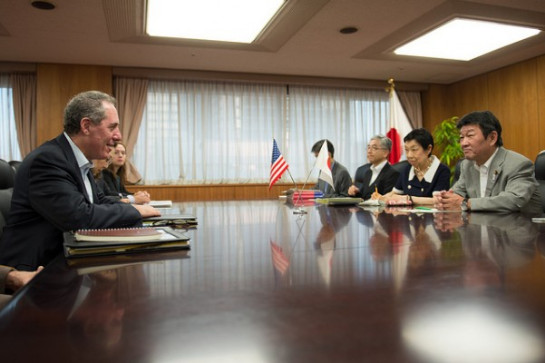
US-Japan Trade Talks Come Up Empty
 In Tokyo on Thursday, US and Japanese sides negotiated into the night with hopes of hammering out a preliminary trade agreement that could act as a major building block for the coveted Trans-Pacific Partnership (TPP). But the efforts of USTR Michael Froman and Japanese Minister Akiri Amari stalled in the end.
In Tokyo on Thursday, US and Japanese sides negotiated into the night with hopes of hammering out a preliminary trade agreement that could act as a major building block for the coveted Trans-Pacific Partnership (TPP). But the efforts of USTR Michael Froman and Japanese Minister Akiri Amari stalled in the end.
A fresh trade agreement would have meant much for TPP and Obama’s “Asia-pivot”. But if the context of US-Japan relations is any indication, US-Japanese trade talks are still far from dead. For one, the absence of a final agreement does not mean that no progress has been made.
In his news conference in Tokyo, President Obama was quoted saying:
“We made important progress in the Trans-Pacific Partnership, TPP, which will support good jobs and growth in the United States as well as economic reform and revitalization here in Japan. We’re closer to agreement on issues like automobiles and agriculture.”
Besides dealing with just trade, the US and Japan have also sought to link up in the area of security. Most notable has been Obama’s vow to defend Japan in the scenario of a Chinese attack in maritime territorial disputes. Obama’s assurance has also been reciprocated by Japanese Prime Minister Shinzo Abe’s exhortation of “strong leadership” by the US in the global response to the Ukraine crisis. It will be interesting to see if these signs of US-Japanese solidarity eventually spill over into trade relations between the two economic powerhouses in the future.
Last but not least, a US-Japan agreement opens up a valuable opportunity for Abe to finally implement the last so-called arrow—structural reforms—of his cherished “Abenomics” strategy. And Obama knows this. While he has refrained from pushing Abe too forcefully, Obama’s words have exerted a moderate amount of pressure on the Japanese side to adjust their stance.
President Obama asserted during his visit:
“All of us have to move out of our comfort zones and not just expect that we’re going to get access to somebody else’s market without providing access to our own. And it means that we have to sometimes push our constituencies beyond their current comfort levels because ultimately it’s going to deliver a greater good for all people.”
For now, the US-Japan trade talks remain in an impasse. But the window of opportunity still remains as wide open as ever.
Follow Brendan on Twitter @BrendanJConnell
Brendan Connell is an American University Graduate Student and Research Assistant at the American Security Project covering American competitiveness and issues in trade.
Photo From USTR





